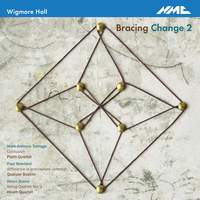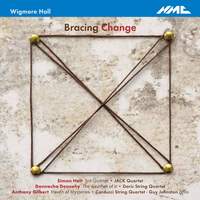Interview,
Bracing Change - Helen Grime on contemporary string quartets
 Much has happened between the first and second rounds of Bracing Change commissions from NMC and the Wigmore Hall. The first, from 2017, feels like it is from a bygone era, with the upheavals of the COVID-19 pandemic waiting to spring themselves on an unwary planet. The second album, released in early April 2023, contains works from Mark-Anthony Turnage, Paul Newland and Helen Grime that, among other things, begin to process something of that seismic event.
Much has happened between the first and second rounds of Bracing Change commissions from NMC and the Wigmore Hall. The first, from 2017, feels like it is from a bygone era, with the upheavals of the COVID-19 pandemic waiting to spring themselves on an unwary planet. The second album, released in early April 2023, contains works from Mark-Anthony Turnage, Paul Newland and Helen Grime that, among other things, begin to process something of that seismic event.
Grime's COVID-19 experience was perhaps particularly intense, as she notes in the description of her second string quartet on the website of her publisher, Wise Music: "By the time I was finishing the first movement, we had gone into a strict lockdown which were strange circumstances in which to be expecting a child."
Despite this, the quartet is categorically no mere "lockdown project", having indeed already been in gestation before COVID-19 hit Europe; the music has a grace, lyricism and ultimate optimism about it that few people in mid-2020 would have felt. I spoke to Helen about this work, and how she sees the genre's place within the contemporary classical world.
The string quartet has been on a long and convoluted journey since it first arose in the mid-18th century. What does the genre mean to you as a contemporary composer?
The weight of the string quartet repertoire can be a bit daunting for many composers. So many composers wrote some of their greatest music for this combination and it is abundant in possibilities. I felt the need to distance myself from this pressure whilst also absorbing as much of its rich history as possible. It is always possible to say something personal and fresh with the four voices in the quartet and this was very much my objective.
This second quartet was commissioned by Wigmore Hall, where you were also the first-ever female Composer in Residence. For those of us who don’t regularly receive composition commissions – what’s the process actually like? Was there a specific remit, or stipulations on what kind of thing they wanted you to write?
This can definitely vary depending on commissioner/commission. When I was appointed Composer in Residence at Wigmore Hall, we discussed three commissions to be spread over several seasons. The combination of each and a general timeline was loosely pinned down but there was no further remit than this. I did however know that I would be writing for the Heath Quartet from the start. It was important to hear them and be aware of their recordings etc. I haven’t yet had a commission where style has been mentioned, and that is something that I’d probably steer clear of, but I do sometimes enjoy the challenge of themes or subjects being mentioned in the commissioning process. That can have an interesting and often surprising impact on my creative process.
The end of the final movement is especially striking – the music almost shivering into silence. Is there any particular meaning in the way it concludes?
Not really. I do like enigmatic endings - the third movement is much more hopeful than the first two in many ways. There is a kind of acceptance and joy in the music. This is never straightforward, however. There is always a darker side and perhaps a veiled, transformed allusion to other parts of the piece.
Your list of teachers would be the envy of many a composer – Sally Beamish, Hafliði Hallgrímsson, Julian Anderson and more. Who would you say were the main influences on your own musical voice?
Many of the composers you mention were teachers when I was very young, early teens - it was most important then to see composing as a thing done by living, breathing people! This in itself was an influence. I have loved classical music from a young age, with French music being a strong influence then - particularly Ravel and Messiaen. When I went to the Royal College of Music, Julian Anderson and Edwin Roxburgh, my teachers there, were hugely influential - in terms of their own music and the music they introduced me to. At that stage I would also mention Boulez, Carter, Knussen and Weir as composers that have been important to me. The list continues to expand and shift as I listen to more and get older!
Some composers write just one string quartet; some write many. This of course is your second – do you anticipate more on the horizon?
It is a combination with endless possibilities and often a chance to grapple with exciting formal ideas. I definitely envisage more if I get the chance!
Piatti Quartet, Quatuor Bozzini, Heath Quartet
Available Formats: CD, MP3, FLAC, Hi-Res FLAC
Guy Johnston (cello), JACK Quartet, Doric String Quartet, Carducci String Quartet
Available Formats: CD, MP3, FLAC




